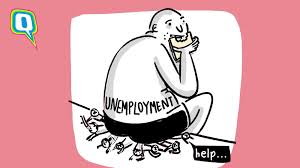Majority of Indians are not satisfied with Modi government's economic performance
69% Indians are saying that their incomes have fallen as inflation and unemployment continue to rise
The economy is being considered the Modi government's biggest failure. Within economic issues, inflation is emerging as a bigger issue than unemployment.
69% percent
people have shared that their income went down due to the pandemic and 17% lost
their jobs. 46% feel that only big businesses have benefited the most from the
NDA government's economic policies.
However,
since Jan 2021, there has been a fall in the number of people who feel that the
Union government is doing a good job when it comes to handling the economy.
While in January 2021, 66% thought it was good, in August 2021, it has fallen
to 47%. Similarly, there has been a fall in the number of people who believe
communal harmony has improved under the NDA rule. In Jan 2021, while 55% said
it had improved, it has fallen to 34%, and the people who believe that communal
harmony has deteriorated have gone up from 22% to 34%.
Historically,
inflation has been politically more harmful for incumbent governments than
unemployment. Therefore, price rise could be a major contributing factor to the
fall in the popularity of the BJP government.
Though this
might be stating the obvious, in the days to come a great deal would depend on
the government's ability to either address economic woes or come up with a
diversion. Conversely, it would be up to the Opposition to keep the focus on
the economy. A lot would depend on what happens in UP. If Yogi Adityanath comes
back to power with a sizable majority, his popularity within the BJP space
could increase, possibly at Modi's expense. On the other hand, if he loses, it
may provide a major boost to the Opposition.
This place
Modi in a curious position - winning UP could strengthen a rival within his own
party but losing it could strengthen the party's rivals.
There has
also been a decrease in the number of people who feel India is safe for women
— it went from 45% in January 2021 to 38% in August 2021.
There has
been a small increase in the number of people who feel democracy is in danger
in India — from 42% to 45% — and 51% agree that people are scared to
protest in India fearing arrest.
When it
comes to COVID-19 and the pandemic, there has been a fall in the perception of
how well a Chief Minister has handled the situation. While in January 2021, 50%
felt that Chief Ministers have done a good job, it fell to 42% this year. 31%
feel their CM’s handling was average and 13% feel it was outstanding.
The most
votes have gone to Odisha Chief Minister Naveen Patnaik, who received 73%
approval in the survey for his state’s handling of the COVID-19 situation.
Assam’s Himanta Biswa Sarma and Jharkhand’s Hemant Soren were next with 72% and
63% each, with Tamil Nadu CM MK Stalin showing a close 62% approval.
71% of
people feel that COVID-19 has killed more people in India than has been
reflected in government data. 44% feel both the Union government and states are
responsible for people's suffering in the second wave. 21% voted for no one.
India
Today’s Mood of the Nation survey was conducted between July 10 and
July 20, 2021, across 115 parliamentary and 230 assembly constituencies in 19
states —Andhra Pradesh, Assam, Bihar, Chhattisgarh, Delhi, Gujarat, Haryana,
Jharkhand, Karnataka, Kerala, Madhya Pradesh, Maharashtra, Odisha, Punjab, Rajasthan,
Tamil Nadu, Telangana, Uttar Pradesh, and West Bengal. A total of 14,559
interviews were conducted (71% rural and 29% urban areas) and 50% were
face-to-face and 50% were telephonic interviews.
Khalid Bhatti














Post a Comment